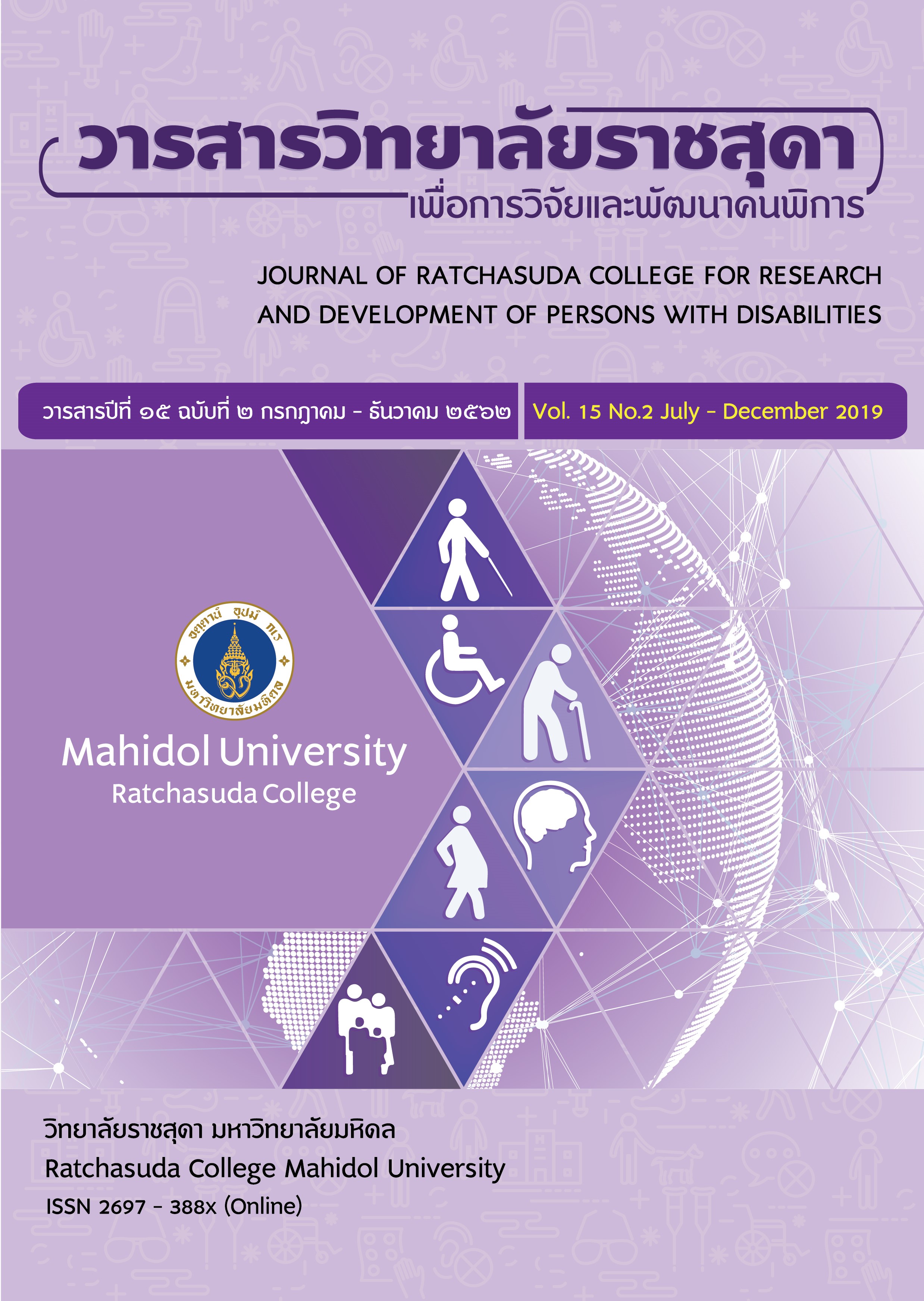Role of Counseling Psychologist in Psychological care of Patients with Spinal Cord Injury and their family members
Keywords:
Counseling psychology, Spinal cord injury, Psychological careAbstract
Not only physical care provision is important for patients with spinal cord injury (SCI) treatment, but also mental health care provision. Mental health care provided by a counseling
psychologist, who is a part of a multidisciplinary health care team delivering rehabilitation services to the patients, is the provision of counseling services to heal, solve, and prevent psychological issues. A counseling psychologist also fosters the development of the patients’ functional abilities during hospital stay, before discharge and aftercare phases. Such holistic care will enable SCI patients and their families to exploit their physical and psychological potentiality to achieve the desired goals, which allows them to live peacefully in a community with good quality of life.
This article aims to present the author’s knowledge, understanding and experience regarding the process of psychological counseling provided to SCI patients in relation to phases of illness, including initial/acute; rehabilitation; before discharge; and aftercare. This is to propose a guideline on providing health care and rehabilitation services for SCI patients and their families.
Downloads
References
Chavasiri, S., Sukprasert, N., & Chavasiri, C. (2018). The incidence of Anxiety and Depression in Patients with Spinal Injury at Siriraj Spinal Unit. The Thai Journal of Orthopaedic Surgery, 42(1-2), 10-17.
Chavasiri, C., Sukprasert, N., & Chavasiri, S. (2019, January). Depression and quality of life in spinal cord injury patients living in the community after hospital discharge. Siriraj Medical Bulletin, 72(1). Retrieved from http://www.smj.si.mahidol.ac.th/sirirajmedj/index.php/smj/article/view/2862
Chotigavanichaya, C. (2005). What’s new in the management of spinal injury. In C. Chavasiri, A. Unnanantana & P. Klomjaiyen (Eds.), Multidisciplinary approach to spinal injured patients. (p.76-82). Bangkok: Ruenkaew.
Craig, A., Tran, Y., & Middleton, J. (2009). Psychological morbidity and spinal cord injury: a systematic review. Spinal Cord, 47, 108-14.
Daensil, P. (2013). To The Breadth of Mind: On The Road of Mind Healing in Buddhist Way Bangkok: Komol Keem Thong.
Dejnuntarat, K. (2005). Counseling is Human Development. In C. Chavasiri, A. Unnanantana & P. Klomjaiyen (Eds.), Multidisciplinary approach to spinal injured patients. (p.127-132). Bangkok: Ruenkaew.
ElfstrÖm, M.L., Kreuter, M., Rydén, A., Person, L.O., & Sullivan, M. (2003). Linkages between coping and psychological outcome in the spinal cord lesioned: development of SCL-related measures. Spinal cord, 40, 23-9.
Fullerton, D.T., Harvey, R.F., Klein, M.N., Howell, T. (1981). Psychiatric disorders in patients with spinal cord injuries. Archives of General Psychiatry, 38, 1369-1371.
Hoffman, J.M., Bombardier, C.H., Graves, D.E., Kalpakjian, C.Z., & Krause, J.S. (2011). A longitudinal study of depression from 1 to 5 years after spinal cord injury. Arch Phys Med Rehabil, 92, 411-8.
Kinson, R., Tan, J., Hussain, D., Looi, P.S., & Tan, L. (2017). Psychological distress following spinal cord injury. European Psychiatry, 41, 465-520.
Kovindha, A. (2016). Textbook of spinal cord injury: comprehensive rehabilitation Vol. 3 Towards independent living. Chiang mai: Thanakit.
Krause, J.S., Kemp, B., & Coker, J. (2000). Depression after spinal cord injury: relation to gender, ethnicity, aging, and socioeconomic indication. Arch Phys Med Rehabil, 81.
Mehaidat, M., Naheyah, A., & Al-Ghuweri, A. (2005). Anxiety and depression symptoms among paraplegic patients. Neurosciences, 10(1), 112-113.
Mueanchoo, S. Keeratiyutawong, P. & Wachirawut, W. (2016). Predictive Factors in Stress-Coping Ability of Caregivers of Spinal Cord Injury Patients. Thai Journal of Nursing Council, 31(1), 124-136.
O’Shea, A., & Smedema, S.M. (2014). Understanding depressive symptoms among individuals with spinal cord injuries: A biopsychosocial perspective. Rehabilitation Counseling Bulletin, 58, 20-28.
Punyapas, S. (2016). Practical points in child and adolescent consultation-liaison psychiatry. In S. Chantakarn, W.Ratthaapha, K. Wannarit & N. Saisavoey (Eds.), Siriraj consultation-liaison psychiatry: psychiatry in the medically ill. (p.11-18). Bangkok: Prayoonsanthai.
Saisavoey, N. (2016). Coping with stress and illness. In S. Chantakarn, W.Ratthaapha, K. Wannarit & N. Saisavoey (Eds.), Siriraj consultation-liaison psychiatry: psychiatry in the medically ill. (p.19-33). Bangkok: Prayoonsanthai.
Scivoletto, G., Petrelli, A., Dilucente, L., & Castellano, V. (1997). Psychological investigation of spinal cord injury patients. Spinal cord, 35, 516-20.
Tresirichod, T. (2018, July 20). Chapter 4 Western and Eastern culture. Retrieved from https://www.slideshare.net/TeeTre/4-77330178
Unnanantana, A. (2005). Establishment of the SPINAL UNIT and roles in patient care. In C. Chavasiri, A. Unnanantana & P. Klomjaiyen (Eds.), Multidisciplinary approach to spinal injured patients.
(p.1-6). Bangkok: Ruenkaew.
Downloads
Published
How to Cite
Issue
Section
License
บทความที่ได้รับการตีพิมพ์เป็นลิขสิทธิ์ของวารสารสถาบันราชสุดาเพื่อการวิจัยและพัฒนาคนพิการ






